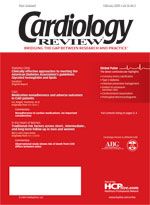Publication
Article
Accuracy of the multislice spiral computed tomography coronary angiography
A 62-year-old white man weighing 78 kg was referred to our cardiac catheterization laboratory for evaluation and percutaneous treatment of suspected ischemic coronary artery disease.
A 62-year-old white man weighing 78 kg was referred to our cardiac catheterization laboratory for evaluation and percutaneous treatment of suspected ischemic coronary artery disease. He was taking diuretics for the treatment of hypertension, but had no other coronary risk factors. Results of his cardiovascular examination were normal. His blood pressure was 150/95 mm Hg, and his pulse was 72 beats per minute (bpm).
An exercise electrocardiogram (ECG) stress test was performed 2 weeks before his visit to our facility. He stopped the exercise at a heart rate of 120 bpm because of chest pain. The ECG at baseline was normal, but at maximal exertion, it showed a horizontal ST-segment depression of 1.5 mm in precordial lead V5.
A multislice spiral computed tomography (MSCT) coronary angiography scan was performed after the patient received 100 mg of metoprolol (Lopressor, Toprol-XL) orally 1 hour before the investigation (Figure). The heart rate decreased from 74 bpm to 66 bpm. The scan showed a hemodynamically significant stenosis in the left circumflex artery. The left main stem, the left anterior descending artery, and the right coronary artery were normal, except for several nonobstructive small calcific nodules. Two days later, invasive coronary angiography preceeding percutaneous coronary intervention confirmed the MSCT coronary angiographic results, and in the same session, the lesion of the left circumflex coronary artery was treated with implantation of a drug-eluting stent.






